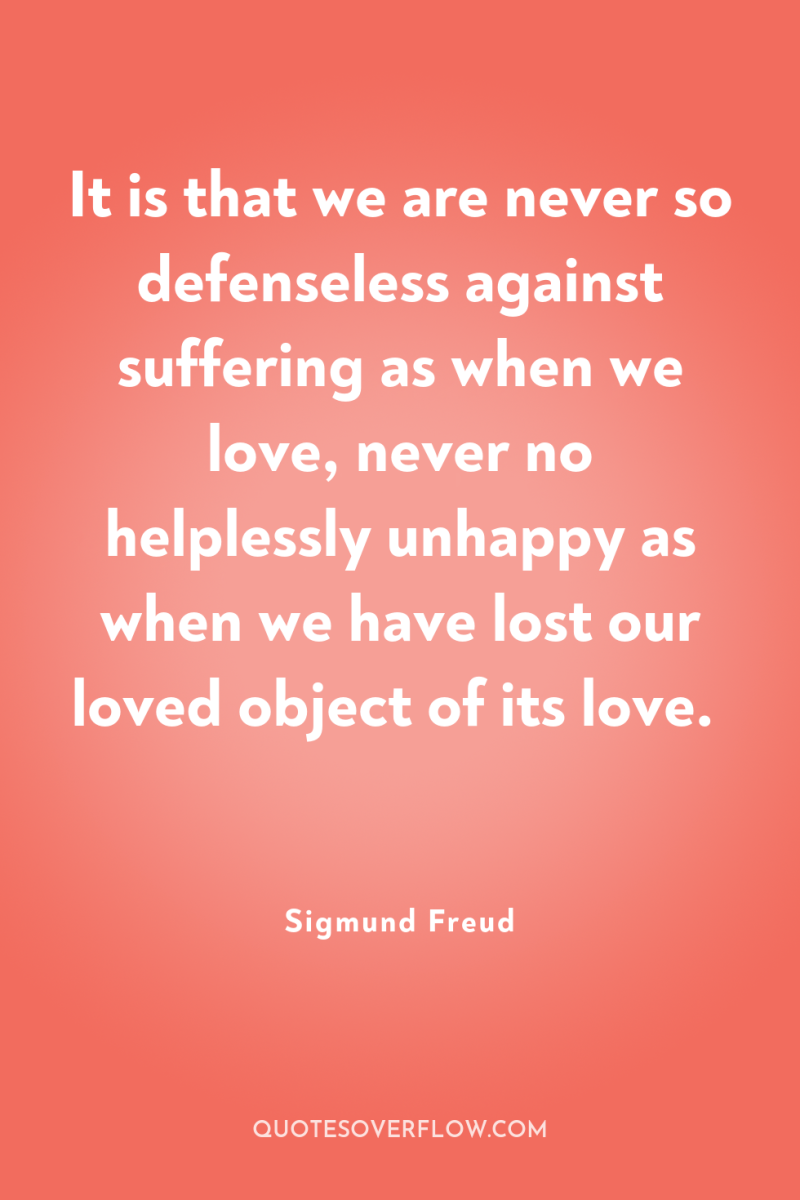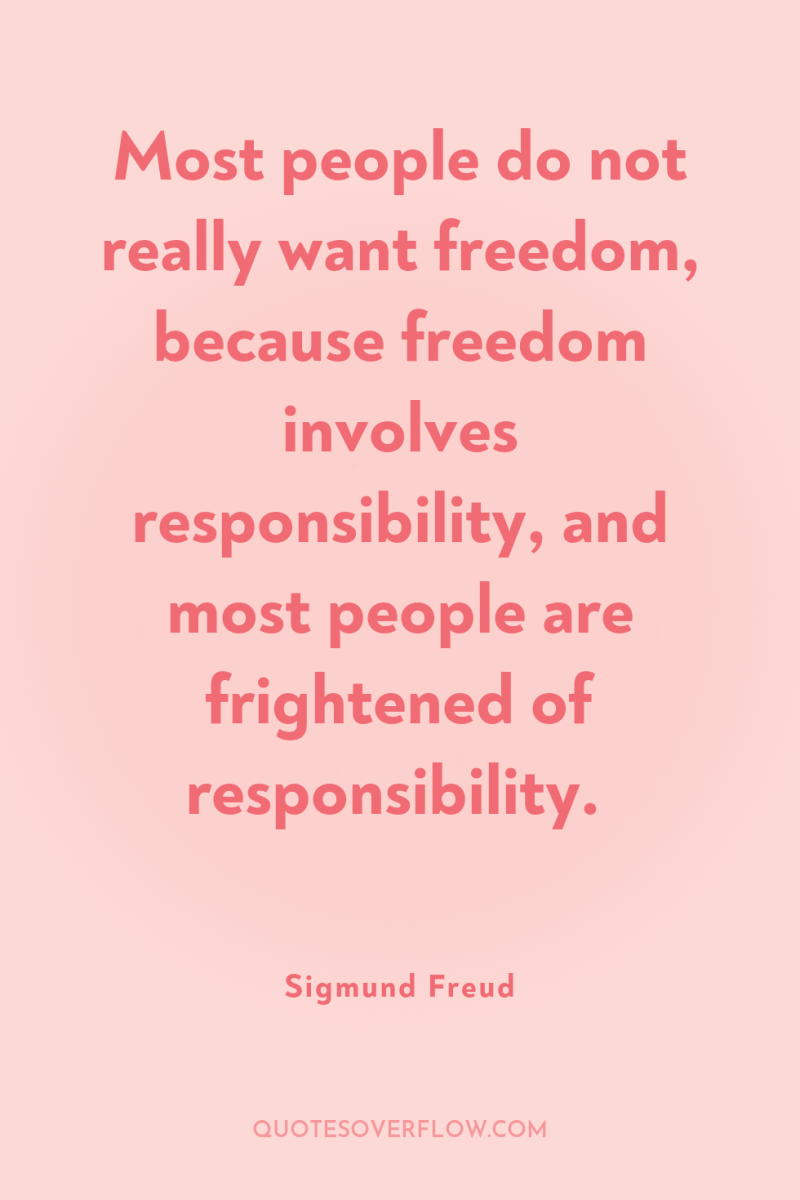
1
It is that we are never so defenseless against suffering as when we love, never no helplessly unhappy as when we have lost our loved object of its love.Sigmund Freud

2
My love is something valuable to me which I ought not to throw away without reflection.Sigmund Freud
3
No other technique for the conduct of life attaches the individual so firmly to reality as laying emphasis on work; for his work at least gives him a secure place in a portion of reality, in the human community. The possibility it offers of displacing a large amount of libidinal components, whether narcissistic, aggressive or even erotic, on to professional work and on to the human relations connected with it lends it a value by no means second to what it enjoys as something indispensible to the preservation and justification of existence in society. Professional activity is a source of special satisfaction if it is a freely chosen one – if, that is to say, by means of sublimation, it makes possible the use of existing inclinations, of persisting or constitutionally reinforced instinctual impulses. And yet, as a path to happiness, work is not highly prized by men. They do not strive after it as they do after other possibilities of satisfaction. The great majority of people only work under the stress of necessity, and this natural human aversion to work raises most difficult social problems.Sigmund Freud
4
I can imagine that the oceanic feeling could become connected with religion later on. That feeling of oneness with the universe which is its ideational content sounds very like a first attempt at the consolations of religion, like another way taken by the ego of denying the dangers it sees threatening it in the external world.Sigmund Freud
5
It is impossible to escape the impression that people commonly use false standards of measurement – that they seek power, success and wealth for themselves and admire them in others, and that they underestimate what is of true value in life.Sigmund Freud
6
We are threatened with suffering from three directions: from our body, which is doomed to decay..., from the external world which may rage against us with overwhelming and merciless force of destruction, and finally from our relations with other men... This last source is perhaps more painful to use than any other. (p77)Sigmund Freud
7
It sounds like a fairy-tale, but not only that; this story of what man by his science and practical inventions has achieved on this earth, where he first appeared as a weakly member of the animal kingdom, and on which each individual of his species must ever again appear as a helpless infant.. is a direct fulfilment of all, or of most, of the dearest wishes in his fairy-tales. All these possessions he has acquired through culture. Long ago he formed an ideal conception of omnipotence and omniscience which he embodied in his gods. Whatever seemed unattainable to his desires - or forbidden to him - he attributed to these gods. One may say, therefore, that these gods were the ideals of his culture. Now he has himself approached very near to realizing this ideal, he has nearly become a god himself. But only, it is true, in the way that ideals are usually realized in the general experience of humanity. Not completely; in some respects not at all, in others only by halves. Man has become a god by means of artificial limbs, so to speak, quite magnificent when equipped with all his accessory organs; but they do not grow on him and they still give him trouble at times.. Future ages will produce further great advances in this realm of culture, probably inconceivable now, and will increase man's likeness to a god still more.Sigmund Freud

8
Most people do not really want freedom, because freedom involves responsibility, and most people are frightened of responsibility.Sigmund Freud
9
In this way the ego detaches itself from the external world. It is more correct to say: Originally the ego includes everything, later it detaches from itself the external world. The ego-feeling we are aware of now is thus only a shrunken vestige of a far more extensive feeling - a feeling which embraced the universe and expressed an inseparable connection of the ego with the external world.Sigmund Freud
10
There is only one state- admittedly an unusual state, but not one that can be stigmatized as pathological- in which it does not do this. At the height of being in love the boundary between ego and object threatens to melt away. Against all the evidence of his senses, a man who is in love declares that 'I' and 'you' are one, and is prepared to behave as if it were a fact.Sigmund Freud
11
It is that we are never so defenceless against suffering as when we love, never so helplessly unhappy as when we have lost our loved object or its love.Sigmund Freud
12
Men are not gentle creatures who want to be loved, and who at the most can defend themselves if they are attacked; they are, on the contrary, creatures among whose instinctual endowments is to be reckoned a powerful share of aggressiveness. As a result, their neighbor is for them not only a potential helper or sexual object, but also someone who tempts them to satisfy their aggressiveness on him, to exploit his capacity for work without compensation, to use him sexually without his consent, to seize his possessions, to humiliate him, to cause him pain, to torture and to kill him. Homo homini lupus [man is wolf to man]. Who, in the face of all his experience of life and of history, will have the courage to dispute this assertion?.Sigmund Freud
13
Men are not gentle creatures who want to be loved, and who at the most can defend themselves if they are attacked; they are, on the contrary, creatures among whose instinctual endowments is to be reckoned a powerful share of aggressiveness. As a result, their neighbor is for them not only a potential helper or sexual object, but also someone who tempts them to satisfy their aggressiveness on him, to exploit his capacity for work without compensation, to use him sexually without his consent, to seize his possessions, to humiliate him, to cause him pain, to torture and to kill him. Homo homini lupus [Man is a wolf to man]. Who, in the face of all his experience of life and of history, will have the courage to dispute this assertion?.Sigmund Freud
14
I may now add that civilization is a process in the service of Eros, whose purpose is to combine single human individuals, and after that families, then races, peoples and nations, into one great unity, the unity of mankind.Sigmund Freud
15
We are so constituted that we can gain intense pleasure only from the contrast, and only very little from the condition itself.Sigmund Freud
16
It is impossible to overlook the extent to which civilization is built up upon a renunciation of instinct....Sigmund Freud